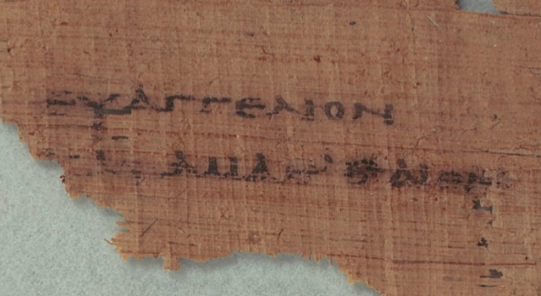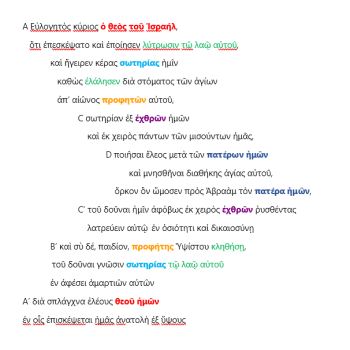You may think I’m a “silly boy” for writing about this. But when Sarah Bond recently wrote a blog post about the ancient Greek use of a tag (sillybos) to indicate the author and title of a work on a scroll, I felt I needed to blog in a bit more detail about the possible implications of this practice for the study of the New Testament, which Bond mentioned briefly. Not that this has not come up before. But one will often hear people outside of the academy (and occasionally even within it) speak about the “anonymity” of the New Testament Gospels as though this were something surprising. The placement of a title at the top of the first page is something relatively new. It goes along with the development of the codex, since in a scroll, you wouldn’t want to have to unwind it all the way to see what it was. And so tags were used. Even in codices, whether a title would be included, and if so whether it would be at the start or end of a work, varied for a long time.
And so it seems to me unsurprising that the Gospels lack titles of the kind modern readers expect. Would the earliest version of Mark ever have been written on a scroll? It is impossible to know (Francis Moloney thinks so, and so too does Ben Witherington). But at the very least, its author would have been more used to reading scrolls than codices, and might therefore have expected any designation for his literary work to go on a tag rather than someplace else.
It is probable that the Gospel of Mark would have been known initially as “The Gospel of Jesus Christ,” with the author certainly known to those who first read the work. The Gospel of Matthew would have been known as Βίβλος γενέσεως Ἰησοῦ Χριστοῦ (“The Genesis/Genealogy of Jesus Christ”). The author of the Gospel of John may perhaps have hoped that his work would be confused with that other, already famous “In The Beginning,” and so actually have had the evangelistic purpose some have detected in the statement of purpose in John 20:31. With the composition of these other works in the same vein, however, it became natural to refer to them in a similar way, with the author being the point of comparison between them. The fact that the first of them highlighted the word Gospel at its start would then explain well why the titling followed Mark’s lead. And given that it is the conclusion of modern scholarship that Mark was written first, but that this was not the historic view of the order of the Gospels, the convergence of modern scholarship on the order with these ancient considerations about the titles is perhaps noteworthy.
(I’m pretty sure no one ever called the Gospel of Luke ΕΠΕΙΔΗΠΕΡ ΠΟΛΛΟΙ ἐπεχείρησαν ἀνατάξασθαι διήγησινπερὶ τῶν πεπληροφορημένων ἐν ἡμῖν πραγμάτων… And that too is something worth talking about, since it begins in a manner that does not make for easy reference. Might it have been referred to as ‘The Things Concerning Which You Were Instructed’ or perhaps ‘In the Days of Herod the Great,’ the words which follow the introducion?)
When groups tended to use a small number of books (and in those times, very few individuals or groups owned large collections), shorthand ways of referring to them would be preferred. Even today one can find numerous examples of this.
For those who’ve been wondering ever since they read the title, the Greek word σύλλαβος is supposed to provide the origin of the English word syllabus. But in fact, the word for a tag on parchments was σίττυβας, and it seems that “syllabus” therefore derives from a transcription mistake that was made in a Greek word, or a Latin word derived from it. You can read in various places online about the debates regarding the term – and how to make the plural of “syllabus” in English if it is neither properly Greek nor properly Latin.
See also my earlier two posts on the question of whether the Gospels were originally anonymous:
Were the Gospels originally anonymous?
As you’ll see in the first post, we have actually found a “flyleaf” or attached tag indicating the title of the Gospel of Matthew. We know from the history of literature that the ways works were referred to could change over time.
What do you think the relevance is of this ancient practice of “tagging” literature (with what we today would call “metadata”) for the question of the titles and authorship of the New Testament Gospels?













